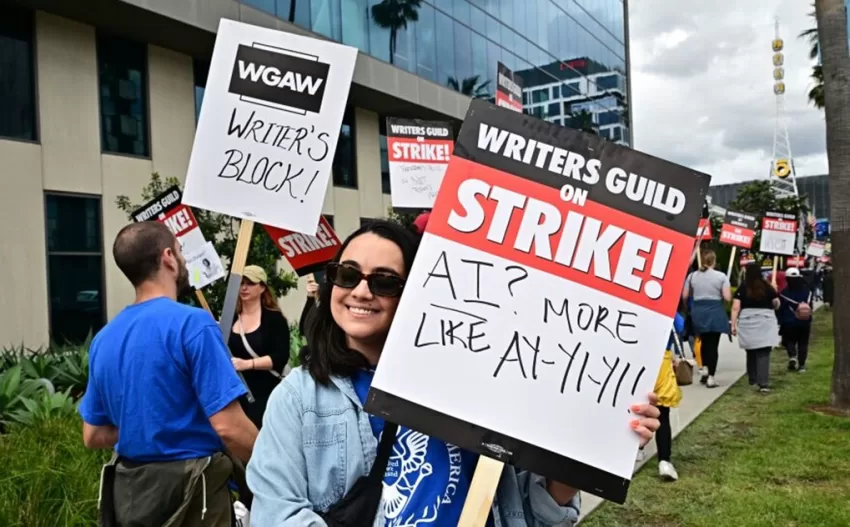 By Andrew Jenck
By Andrew Jenck
On May 2, the contract between the Writer’s Guild of America and the film and TV studios expired, halting virtually all writers in Hollywood from working on any projects. Even within its first month’s productions of Marvel’s Blade, Game of Thrones: A Knight of Seven Kingdoms, and Stranger Things have been stalled. As with most union strikes, the WGA is concerned over fair wages, but the scope is broader, calling for the industry to adapt to the new distribution model and ensuring job security. Due to unclear distribution of royalties, limiting creative processes, and the threat of AI technology, Hollywood is caught in limbo, in which unfair treatment of employees could lead to media taking a nosedive in quality.
You probably have a ton of shows on your watch list and struggle to catch up with the rapid fire of TV. Imagine what that’s like for the writers having to keep up with this output. To keep us with this rapid-fire output, studios have composed mini-writer rooms: a fraction of what TV series’ employed just five years ago, tasked with six weeks to comprise the season. Veteran writers have criticized this approach, as it hinders the workers’ creativity and growth. Before, upcomers would be paired with established showrunners and could learn to improve their craft from the more-established authors. If you watched a season where the story felt undercooked or overextended to fit the episode count, then it could be the lack of proper direction and time for refining the scripts. George RR Martin blasts these mini-rooms as “abominations,” robbing any writers new to industry from learning about the production. The WGA calls attention to this standard and demands more reasonable deadlines to ensure writers can grow in their careers.
Pre-Netflix, a writer generally would receive residuals based on the number of times their episode would be rerun. As TV has moved to streaming, this receipt method is now muddled with distributors opting for a fixed annual fee based on the number of subscribers. Few series have seasons passing ten episodes, meaning fewer residuals. Residuals had increased last year, but the current terms don’t factor in the differing streaming prices across borders. Given the high living expenses of Los Angeles, these residuals can only go so far as writers may struggle to find work in a heavily competitive environment or potentially dealing with factors beyond their control.
Improved working conditions and higher pay are common in union strikes, but the WGA also looks to ensure employment against the rise of AI technology. Although in its early stages and currently unable to form coherent screenplays, AI is viewed as a potential method of reducing costs and creative differences. Writers have some leverage in that AI-generated content can’t be copyrighted unless “altered by an actual human.” However, studios will insist on partial use of the algorithms for supposed efficiency, boxing employees into stricter guidelines. Even now, studios are considering generating scripts and have the writers merely write over them once the strike concludes. Even just used as a framework, this would be disingenuous, as art needs to spark from some sort of vision, comprised of the creators’ experiences. Making compromises with studio executives is challenging enough; writers shouldn’t need to collaborate with a computer.
Strikes are meant to be disruptive, forcing the employers to recognize their workers’ worth and give them fairness. While this year’s TV and film schedule is set in stone, expect delays further into 2024. Quality may also suffer as the 2007 Writers’ Strike resulted in rushed productions and barely functioning scripts. As The Wire creator, David Simon said, writing is a constant throughout the filmmaking process, it shouldn’t be tossed out once the cameras roll. This strike was more than preventable given the high revenue streams and paychecks of the higher ups. This isn’t a case of employees being greedy. It’s about ensuring relevancy in an ever-changing market, stable income, and providing greater opportunities for writers to grow. Consumers have a lot of engaging stories at their disposal, but should studios write off the writers, the best narrative from Hollywood would be how people were barred from improving their storytelling.


